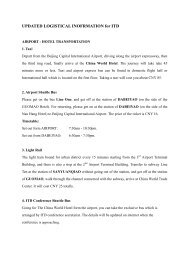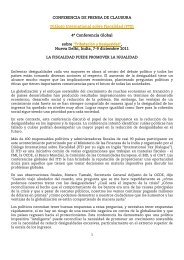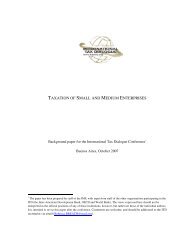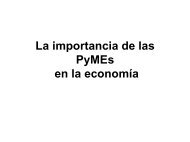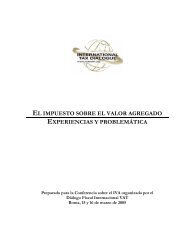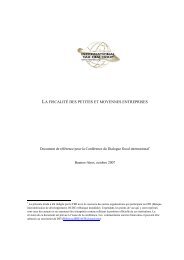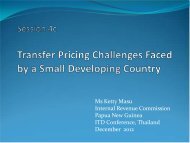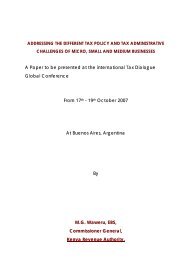Arcotia Hatsidimitris - International Tax Dialogue
Arcotia Hatsidimitris - International Tax Dialogue
Arcotia Hatsidimitris - International Tax Dialogue
You also want an ePaper? Increase the reach of your titles
YUMPU automatically turns print PDFs into web optimized ePapers that Google loves.
72 – 8. TRANSFER PRICING AND DEVELOPING COUNTRIES<br />
Box 20. Difficulties in obtaining relevant information – an African <strong>Tax</strong> Commissioner’s Experience<br />
• Multinational enterprises can be economical with the provision of data and information to auditors<br />
and inspectors. This can make it extremely difficult for tax administrations to prove that their transfer<br />
pricing concerns are well founded. In many cases key information is thought to be deliberately<br />
withheld from the tax administration in order to hide the potential tax liabilities.<br />
• In other circumstances, multinational enterprises overwhelm tax administrations with volumes of<br />
irrelevant information with the result that the attention is diverted from the real information that the<br />
tax administration needs to reach proper conclusions.<br />
• Double <strong>Tax</strong> Agreements are not always effective in securing vital information needed in a transfer<br />
pricing audit or enquiry. Often the tax administration requesting the information has to wait for long<br />
periods of time, sometimes over six months before receiving any feedback and even then it might<br />
not receive the crucial information it needs.<br />
• Management fees are one of the many ways that multinational enterprises are using to reduce<br />
taxable profits in African countries. Usually these fees have no relationship with the actual cost of<br />
providing any management services but are just expressed as a fixed percentage of revenues.<br />
When questioned about the justification of the fees, the multinational enterprises provide a figure of<br />
Head Office expenses that has been apportioned to the entity which eventually bills the African<br />
entity. When requested to provide the trial balances of the Head Office so that the tax administration<br />
can apply its mind to the expenses apportioned, a multinational’s subsidiary or branch says that it<br />
does not have access to that information. The conclusion the taxpayers make is that even if a direct<br />
method of charging the African entity was used, the results would have been the same or an even<br />
higher charge could have been made to the African entity.<br />
• Another example of difficulty relates to management fees. Often management fees are charged<br />
where the local company has competent and capable management of its own. There is often visible<br />
duplication of functions and/or services but multinational enterprises seek to find ways of explaining<br />
away any duplication. Auditors and inspectors are sometimes not sure what criteria to apply to<br />
decide whether to accept these explanations as valid. For example, the taxpayer will usually<br />
describe a lot of value adding activities that the parent company or related party is performing, and<br />
yet these aspects will be outside the scope of the contract signed between the related parties, and<br />
the contract is the only legal basis of the management fees that are being paid.<br />
• The use of tax havens is still prevalent in an African context. Goods are often sold by a related party<br />
to the tax haven entity which simply acts as a re-invoicing vehicle. An inability to access financial<br />
statement of the tax haven vehicle can make it hard to test whether re-invoiced prices are arm’s<br />
length prices. This problem is further compounded by the lack of transfer pricing documentation in<br />
Africa. The majority of subsidiaries of branches of multinational enterprises simply state that they do<br />
not have transfer pricing documentation but they are transacting with related parties at arm’s length.<br />
Even in situations where the transaction is not routed through a tax haven vehicle, the lack of<br />
information from the other group entity regarding their margins and other accounting ratios makes<br />
arm’s length testing in the value chain very difficult.<br />
• The tax authorities’ lack of access to databases like Amadeus and Orbis, and the lack of knowledge<br />
on how to carry out an economic analysis based on such databases where they are available is a<br />
problem that makes transfer pricing audits and enquiries even harder.<br />
This testimony illustrates how problematic transfer pricing can be and the particular difficulties<br />
associated with the issue of management fees. However, it is possible to challenge the arbitrary allocation<br />
of head office expenses on the basis that there is no evidence of any value being received, or if there is<br />
value added that it is not proportionate to the amounts being charged. This is an example of how the<br />
application of first principles, rather than complex transfer pricing concepts, can be very effective. It is<br />
helpful if the legislative framework makes it clear that it is for the MNE concerned to establish that the<br />
level of management fees is justified by the value that has been added by the other parts of the MNE. But<br />
this does not alter the fact that a lack of good quality commercial information in developing countries is a<br />
major challenge for their tax administrations.<br />
DEALING EFFECTIVELY WITH THE CHALLENGES OF TRANSFER PRICING © OECD 2012





